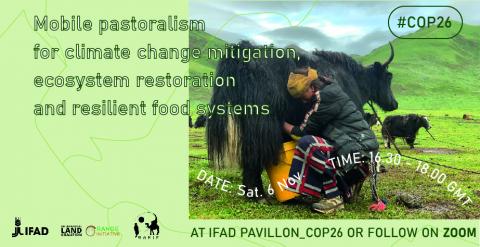
The Rangelands Initiative joins with the International Fund for Agricultural Developement (IFAD) in efforts to gather an extensive delegation at COP26 in Glasgow of pastoralist representatives from different parts of the world to carry out a full programme to highlight the importance of pastoralism and rangelands to confront the Climate Crisis and the need to highlight the benefits of the extensive and pastoralist livestock system and how it difers from the more environmentally harmful intensive and industrial format .
Many of the delegates are also part of the Rangelands Initiative Regional Networks and also from the World Alliance of Nomadic Indigenous Pastoralists (WAMIP). Amongst the activities being organised there will be a side event titled “Mobile pastoralism for climate change mitigation, ecosystem restoration and resilient food systems", on Saturday, 6 November from 16.30 to 17.30 (GMT) at the IFAD Pavilion at COP26 , and also streamed online for which you can register here: https://storm-virtual-uk.zoom.us/webinar/register/WN_keXuZTaFSK2BX1Yqq7XEww
Other events will range from talks at the People's Summit for Climate Justice (organised by the COP26 Coalition), sessions dedicated to highlighting the importance of food systems in addressing the challenges we face - a theme not being covered by the official COP26 programme. Led by Nourish Scotland, “Recipes for Resilience” is supported by over 30 civil society organisations and food businesses. Also, a public roundtable entitled " Living with cows in a net zero future" , a sheep action and demonstrations (more detailed information to follow).
The pastoralists attending COP26 are making the long journey to Glasgow, with all the attendant visa and Covid challenges, to make the case that sustainable livestock farming, which is in tune with the landscape, has a role to play in a net zero world. In many areas of the world, sustainable meat is the primary source of protein. In a recent report, Rangelands Initiative together with PASTRES (Pastoralism, Uncertainty and Resilience) and other partners outlined how millions of people worldwide, who depend on lower impact livestock production, are being ignored in debates on the future of climate crisis mitigation policies and to ensure food resilient systems.
Over the next few days, the delegation will also debate and present the initial ideas to launch a Global Campaign for Pastoralists Rights for 2022.
